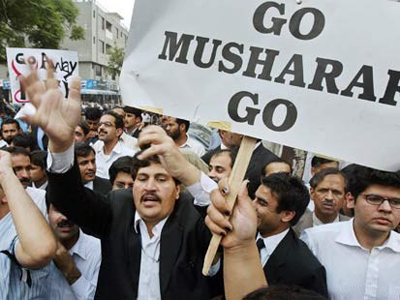
Archive 2009
|
November 16-30, 2007
Pakistan in deep crisis 
The declaration of Emergency by President General Pervez Musharraf marks the deepening of the crisis that has engulfed the state and ruling circles of Pakistan. Immediately following the declaration of Emergency, the Pakistan government has arrested judges, lawyers and political activists opposed to the Musharraf regime. There have been clashes between protesting lawyers and the police in Lahore and other towns. In both its western provinces, the Pakistani state is faced with the rebellion of people of the various tribes. Hundreds of soldiers of the Army have deserted and joined the resistance movement of the tribal people. Army formations have become the special targets of attack by the resistance fighters. Over a thousand soldiers of the army have been killed in the war against the tribal people. The Pakistani army is treating its own people as enemies, killing thousands of ordinary civilians and even bombing entire villages from the air. The people in the western provinces, closely linked with the neighbouring people of Afghanistan, have refused to join the US led “war on terror”. Instead, they have turned their guns on the US forces and the Pakistani army and defended their Afghan brothers and sisters. With the army alienated and isolated from the people, the control of the Pakistani state in these two provinces has become weakened,. Throughout the country, the opposition of the people to the Musharraf regime’s active military collaboration with US imperialism has mounted. People are naturally opposed to Pakistan’s role in helping the US in the Afghanistan war and its role in the suppression of popular resistance in Baluchistan and the Northwest Frontier province. People are opposed to the military rule. Like people in other countries, the Pakistani people too yearn to be masters of their own destiny. In his address to the country and the world, President Musharraf pointed to the weakening of the authority of the Pakistani state, to justify the imposition of emergency. In the typical manner of ruling class politicians, he has blamed the people for this state of affairs–calling them extremists, terrorists and supporters of terrorism. He has appealed to the US and European powers to continue to support him in the “war against terror” and “his effort to establish democracy”. The US imperialists have a strategic interest in the situation in Pakistan and they have an important say in its internal affairs. General Musharraf, as well as the political parties led by the two former Prime Ministers, Nawaz Sharif and Benazir Bhutto, all look towards the US to back them. Each of them is busy trying to convince the US that they represent the best choice for ensuring that Pakistan remains a firm front-rank ally of US in the "war against terror". At the present time, US imperialism is deeply worried that it may not be able to manipulate the revolt of the Pakistani people in a direction favourable to its interests. The revolt in the armed forces is indicative of the widespread popular resentment among the people. In the past few weeks, the US tried to broker a deal between the General and Benazir Bhutto, in which the two would share power. How this deal plays itself out now, remains to be seen. The US and the Pakistani ruling class might even try to play out some charade of restoration of democracy. The aim will be to ensure that the interests of the US and the ruling classes of Pakistan are safeguarded. The Pakistani people will not benefit from such US sponsored “regime change”. They will gain nothing from either Bhutto or Sharif, replacing General Musharraf. The US will continue to have a strategic say in Pakistan's foreign policy and the exploitation and sell out of Pakistan will continue unabated.. All the miseries of the people of Pakistan stem from the rule of reactionary ruling classes and the US imperialist domination. The people of Pakistan have to break out of the clutches of US imperialism and the ruling clique which is closely linked with US imperialism. Only then can they change the course of affairs in their country. |
